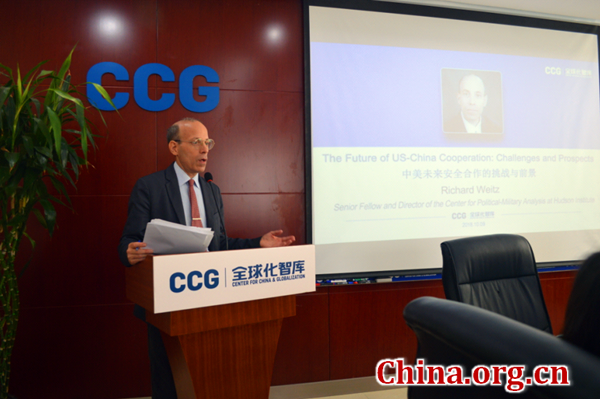Hudson Institute researcher: No US-China Cold War yet
- By Zhang Rui
 0 Comment(s)
0 Comment(s) Print
Print E-mail China.org.cn, October 12, 2018
E-mail China.org.cn, October 12, 2018
A senior researcher of American think tank Hudson Institute said in Beijing on Oct. 9 he doesn't believe that China-U.S. relations will move toward a new state of Cold War.

Richard Weitz, a senior fellow and director of the Center for Political-Military Analysis at the Hudson Institute, joined a roundtable discussion at the headquarters of the Center for China and Globalization (CCG) in Beijing and shared his opinions just after U.S. Vice President Mike Pence's speech against China delivered at the Hudson Institute on Oct. 4 and the U.S. Secretary of State Mike Pompeo's short visit to Beijing on Monday.
Weitz said that Pence's speech does not mean that China and the United States have entered a new Cold War, despite some analysts considering it similar to an "Iron Curtain" speech. His understanding is that the U.S. government still regards Russia as its biggest threat and that the China-U.S. trade dispute does not represent the beginning of an economic Cold War.
With the United States' imposition of massive tariffs on Chinese imports and threatening to impose more as well as making various accusations this year, the two countries' relations have hit a rough patch.
While U.S. President Donald Trump first initiated the trade war and recently accused China of meddling in the U.S. midterm elections at the UN Security Council, Pence also accused China of a series of so-called "wrong doings" in topics ranging from Taiwan, the South China Sea, political meddling, as well as trying to undermine Trump's presidency. Under this background, Pompeo visited China to seek cooperation on the North Korea nuclear issue.
Despite a wide range of differences between China and the United States, Weitz suggested that the commercial conflict of interest between the two countries is the main cause of China-U.S. disputes, so solving these conflicts of interest can lead to a breakthrough in solving the two sides' economic and trade disputes.
The researcher also pointed out that Pence's speech did not mention any specific U.S. policy or measures to resolve the current China-U.S. disputes, so everything remains unknown and the two sides will need to continue dialogue and negotiations.
He added, for the "trilateral relationship" among China, the U.S. and Russia, if the relationship between any two countries is out of balance, it will have a great impact on Sino-American relations.
This year marks the 40th anniversary of the signing of the Joint Communique on the Establishment of Diplomatic Relations between China and the United States. It is also the 40th anniversary of China's reform and opening up.
Wang Huiyao, president of the CCG, stated in exchanges with Richard Weitz and other experts and researchers that after 40 years of development, China and the United States have shared many common interests, and at a time when China-U.S. trade relations are tense, the civil and cultural exchanges should be strengthened, especially for Chinese and American think tanks.






Go to Forum >>0 Comment(s)